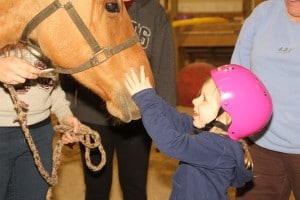 Think about all of the different things you take for granted every day. There are probably lots of them – things like driving a car, speaking aloud to a loved one, or even sitting up at the dinner table. There are many adults and children living with disabilities who do not always have these privileges. However, thanks to organizations like Equi-Librium Therapy Center in Rogersville, Missouri, about an hour north of Branson, there is something that those with disabilities can have – horseback riding.
Think about all of the different things you take for granted every day. There are probably lots of them – things like driving a car, speaking aloud to a loved one, or even sitting up at the dinner table. There are many adults and children living with disabilities who do not always have these privileges. However, thanks to organizations like Equi-Librium Therapy Center in Rogersville, Missouri, about an hour north of Branson, there is something that those with disabilities can have – horseback riding.
Equi-Librium Therapy Center (ETC) was originally a therapeutic riding program that was operated out of the MSU Darr Agricultural Center located in Springfield, MO. After the program was released by the agency it operated under, Kent Crumpley, the current program director of ETC, found that many of the parents whose children participated in the therapeutic riding sessions wanted the program to continue. “I decided to carry it on,” said Kent. So four years ago, he rebranded the program, founded the not-for-profit organization, started from scratch with new therapeutic riding horses, and ETC was born.
ETC is located on thirty-seven acres, and is complete with a 220×100 square foot indoor riding arena with a spacious viewing room for parents and guests. The facilities were donated to the program by John and Carol Courtney. The mission statement of ETC is ‘to provide exceptional, accredited, equine therapy services, improving the quality of life for those in the Ozarks.’ ETC is not just a riding stables – it is the home of a true medical profession. They are the only PATH Intl’ (Professional Association of Therapeutic Horsemanship International) Premier Accredited Center in the Southwest Missouri area, and they are also a member of the American Hippotherapy Association. Kent employs twelve full time staff members at ETC, including speech, occupational and physical therapists, and over two hundred volunteers. The center offers therapeutic riding, hippotherapy, and multiple programs that introduce troubled teens to horses. Hippotherapy is often used with patients that have cerebral palsy or other severe disabilities – a physical therapist will do an evaluation on the individual, and will then implement a program with them to work on improving balance and muscle strength while using a horse as a therapy tool. Another unique program at ETC is the Warriors Walk On program. ETC partners with the Wounded Warrior Project so that returning servicemen and women can benefit from mental and physical therapy with horses. The program is free – “It gives you a sense of giving back,” Kent said.
The horses at ETC undergo a fairly intense training process – Kent introduces them to various props and evaluates their behavior, gait, and health at this time. Not all horses make the cut – those who aren’t quite cut out to be in the ETC program are sold or adopted, and the proceeds benefit the program. ETC currently has fourteen therapy horses, including Quarter Horses, a Halflinger, and ponies for smaller children.
ETC serves 600 individuals living with disabilities annually. No one is turned away if they cannot afford to pay for the program. Through grants and donations, everyone is given a chance to ride. “It’s their sport,” said Kent. He went on to say that for children who are not physically able to play sports like basketball or soccer, therapeutic riding gives them an outlet to be active and involved – it’s not therapy to them. The positive impact of ETC on its riders and program participants is huge – for example, one child who had never spoken a day in his life spoke his first words to encourage his horse to trot. Another child was able to join her family for Thanksgiving dinner at the table sitting by herself for the first time because of the balance and muscle strength she gained from her riding therapy.
In the future, ETC plans to expand by adding therapy rooms, indoor classrooms, and a Century Trail, the latter with the help of the Wounded Warrior Project. ETC will also be providing the volunteers for the 5K Color Run in Springfield – they are the only charity to benefit from the run. Kent encourages the public to get involved with ETC by volunteering at the center, adopting a horse, donating funds, or sponsoring a rider. He says there is nothing more gratifying than helping people heal with horses. “It’s my time to give back,” he said. “It’s therapy for everyone.”

